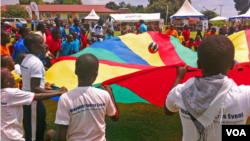Outside of Kampala, a rehabilitation center known as the Comprehensive Rehabilitation Services for Uganda (CoRSU) is doing extraordinary work. By bringing together doctors, volunteers and donations from around the globe they’ve established the first and only rehabilitation center for disabled children in the country.
At CoRSU the focus is on abilities, not disabilities.
On a lush grassy lawn outside the main hospital, a mix of current and former patients take center stage, competing in a round of sports games and silly dances. The theme of the day being: Let Them Play. For children with missing limbs, deformities and trauma this is a rare event.
The purpose is to raise money for a new playground and sports field. They want to transform their old playground into an area that’s friendly to all sorts of disabilities, whether it’s missing limbs or limited movement.
Life for the disabled in Uganda is difficult, but for children it can be devastating.
Christine Tusiime, the principal physiotherapist at CoRSU, describes the challenges facing the disabled here.
“It stops them from playing like other kids, from socializing with other people," she said. "And usually when they tried to socialize, they are then stigmatized or called names depending on their disability… Of course from that, they tend to get low self-esteem, so they stop socializing and then they have psychological issues and challenges that come out from not being able to interact with kids their age, not being able to play, and generally not being able to go to school… Even if the parents wanted to take them out, to the theater, to the museum, it’s very hard to do that because they can’t access the structures that are there."
CoRSU treats patients from all over Uganda, and some surrounding countries, including South Sudan and the DRC.
Inside the compound there are surgical theaters, therapy rooms, dorms and even a primary school. Therapies can last from a few days to a couple months. They also integrate support groups for parents and families, who sometimes have trouble understanding the disability.
The employees at CoRSU take immense pride in what they do.
Moses Dennis Kaweesa, a prosthetics technologist, grew up with a family member who had lost a leg and it spurred his interest in prosthetic development. He says children, by far, are some of his favorite clients.
“If you don’t walk and then end up walking… especially kids they don’t take long when you fit them," he said. "One, two days and they’re running… It’s really interesting to see them walking… When they leave they smile and they give the happiness and they get to do new things, running and playing. It gives me courage day by day.”
CoRSU receives no funding from the government and relies primarily on the kindness of donors, most of which come from abroad. They supplement their income by providing pharmacy, X-ray and laboratory services to the neighborhoods surrounding them. They are hoping that in the future a self-sustaining practice will be possible.





